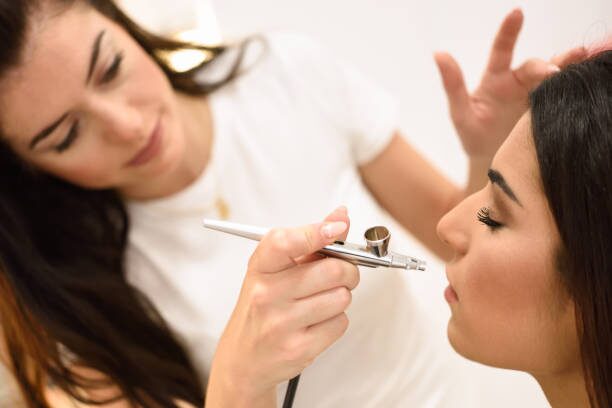Contents

Wedding makeup and evening makeup might seem similar at first glance, but there are significant differences between the two. These differences are dictated by the nature of the event, the goals of the makeup, and the techniques used. Let’s explore what makes wedding makeup unique and how it stands apart from classic evening makeup.
Long-Lasting Durability
One of the key distinctions of wedding makeup is its durability. A wedding is a full-day event, starting early in the morning and often lasting late into the evening. The bride’s makeup needs to withstand tears of joy, hugs, kisses, photoshoots, dancing, and other activities.
Wedding makeup uses long-lasting cosmetics that are designed to endure all these challenges. Makeup artists rely on primers, setting sprays, and waterproof products to ensure the look stays fresh throughout the day.
Evening makeup, on the other hand, does not typically require such a high level of endurance. It is designed to last a few hours and is less affected by the intensity of the event.
Focus on Natural Beauty
Wedding makeup is characterized by its subtlety and lightness. The main goal is to enhance the bride’s natural beauty, creating a soft and romantic look.
Key features of wedding makeup include:
- Carefully chosen shades that harmonize with the bride’s skin tone, hair color, and attire.
- Lightweight textures that create a “second skin” effect.
- Soft, pastel, or warm tones for eyeshadows and blush.
Evening makeup, in contrast, is often more dramatic and bold. It allows for the use of intense colors, more pronounced contouring, and striking accents on the eyes or lips. The goal of evening makeup is to create a standout look that captures attention, especially in artificial lighting.
Adaptation for Photography
Weddings almost always involve professional photography and videography. Wedding makeup needs to be camera-ready, which means:
- Using products that prevent shine in photos (e.g., mattifying powders).
- Achieving a flawless complexion without blemishes, redness, or excessive shine.
- More defined, yet not overly heavy, facial features to ensure the makeup doesn’t look washed out in photographs.
Evening makeup, while it can be photographed, isn’t always tailored specifically for lighting or professional cameras. The emphasis is usually on creating an impactful look for real-life interactions.
Personalized Approach
Wedding makeup is highly personalized, taking into account many factors:
- The wedding theme (classic, rustic, boho, etc.).
- The color palette of the bride’s dress and accessories.
- The bride’s skin type, features, and personal preferences.
Evening makeup is typically less customized. It is usually styled to match the outfit’s general vibe without delving deeply into the details of the wearer’s personality or the event.
Emotional Aspect
A wedding is one of the most emotional events in a woman’s life. Makeup must help the bride feel confident and comfortable throughout the day. Makeup artists pay close attention not only to technique but also to their interaction with the bride, creating a positive and relaxing atmosphere.
Evening makeup, while fulfilling its aesthetic purpose, rarely carries the same emotional weight. Its goal is to create a stylish and striking look without diving into deeper symbolism or sentimentality.
Techniques Used
Wedding makeup often involves advanced professional techniques, such as airbrushing or multi-step skin preparation. These help achieve a flawless result that looks impeccable both in person and on camera.
Evening makeup is generally created with more standard methods since it doesn’t require the same level of longevity or versatility.
Color Accents and Style
Wedding makeup is predominantly soft and delicate, focusing on natural beauty. Bold and dramatic colors are rarely used to avoid distracting from the overall bridal look and to maintain harmony.
Evening makeup can feature daring color choices: bold lips, vibrant eyeshadows, or glitter. It’s designed to stand out, especially under evening lighting.
Cost and Time Required
Wedding makeup usually takes more time to apply than evening makeup. This is due to its complexity, multi-step skin preparation, and the need for a flawless finish. It also tends to cost more, as it requires high-quality products and the expertise of an experienced makeup artist.
Evening makeup, while it can be professional, is often quicker to create and less expensive.
Conclusion
Wedding makeup is more than just makeup; it’s an integral part of the bride’s unique look that must be harmonious, long-lasting, and suited to the special day. The differences between wedding and evening makeup lie in the requirements for durability, naturalness, adaptation for photography, and a personalized approach.
Each type of makeup serves its purpose, and understanding these distinctions ensures that you’ll look flawless and feel confident, whether on your wedding day or at an evening event.